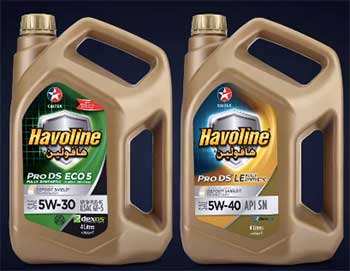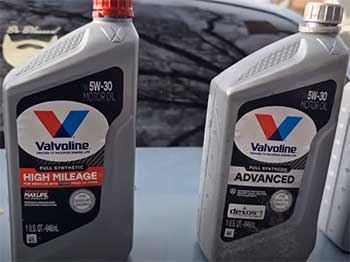Today we’re diving deep into a topic close to every motor enthusiast’s heart: motor oil. It’s like the lifeblood of our beloved machines, and two of the titans in this industry, Havoline and Valvoline, have quite the rivalry.
Let’s explore each one’s pros and cons in a comprehensible, engaging manner that’ll help you make a wise decision for your car.
A Brief Comparison Table
| Aspect | Havoline | Valvoline |
|---|---|---|
| Ownership | Chevron Corporation | Ashland Inc. |
| Formula | Deposit Shield Technology | Unique blend of high-quality base oils and additives |
| Product Range | Motor oils (high mileage, synthetic blend, fully synthetic) | Wider range including motor oils, antifreeze, brake fluids, etc. |
| Reputation | Known for excellent lubrication and thermal stability | Known for innovation and superior cleaning capability |
| Performance in Extreme Conditions | Excellent in hot conditions | Well-rounded performance across all conditions |
Understanding Motor Oil – Why It Matters
Before we compare these two giants, let’s quickly understand why motor oil is essential. In simple terms, motor oil is a lubricant used in internal combustion engines.
These engines are present in cars, motorcycles, and other vehicles. They reduce friction, lessening wear, and provide protection against rust and corrosion.
Your choice of motor oil can significantly impact your vehicle’s performance and lifespan.
Havoline Oil – Pros and Cons
Havoline Oil comes from the house of Chevron. It has earned a reputation for high performance and excellent engine protection.
Pros of Havoline Oil

- Excellent Lubrication: Havoline has proven to provide superior lubrication under extreme conditions. Its ability to reduce friction and wear on engine parts is commendable, contributing to improved fuel efficiency and increased engine life.
- Heat Resistance: Havoline oil exhibits fantastic thermal stability. It maintains its lubricating properties even in extreme heat, preventing engine overheating.
- Range of Products: Havoline offers a wide range of motor oils, including synthetic blend, high-mileage, and fully synthetic oils, giving consumers an array of choices to fit their needs.
Cons of Havoline Oil
- Availability: Although Havoline has a vast distribution network, it can be challenging to find in some areas compared to other brands.
- Price: While not overly expensive, Havoline is not the cheapest motor oil on the market. Its quality comes at a cost, and for those on a tight budget, it may seem a little steep.
Valvoline Oil – Pros and Cons
Valvoline Oil is another heavy hitter in the world of motor oil. Known for quality and innovation, Valvoline has been serving the automotive industry for over 150 years.
Pros of Valvoline Oil
- Outstanding Performance: Valvoline offers consistent, high-quality performance. Its superior additives help it prevent sludge and varnish deposits, contributing to engine cleanliness and longevity.
- Versatility: Valvoline caters to a wide variety of vehicles, from regular passenger cars to high-performance vehicles. Its versatility is a significant selling point.
- Accessible: Valvoline is readily available in many locations worldwide. It’s easy to find, and with a reputation for reliable service, Valvoline oil changes are a staple in many areas.
Cons of Valvoline Oil
- Price: Similar to Havoline, Valvoline isn’t the cheapest option available. The high quality and performance of this oil come with a slightly higher price tag.
- Mileage: Although it offers excellent performance, some users have reported lower mileage when using Valvoline compared to other brands.
Also Read: Differences Between AMSOIL Boosted And Signature Motor Oil.
Key Differences Between Havoline And Valvoline Oil
Although both Havoline and Valvoline are renowned brands in the world of motor oil, they have distinct characteristics that set them apart. Here, we delve into the key differences to help you make an informed choice.
- Formula Composition

One of the key differences lies in the formula composition of these two oils.
Havoline uses its proprietary Deposit Shield Technology.
This formula is designed to protect against harmful deposits and ensures optimal engine performance.
On the other hand, Valvoline uses its own unique blend of high-quality base oils and additives.
This formulation promotes superior cleaning and protection against wear and tear, providing smooth engine performance.
- Range of Products
While both brands offer a wide range of products, their focus areas differ slightly. Havoline concentrates on a spectrum of motor oils for different types of engines, including high mileage, synthetic blend, and fully synthetic oils.
In contrast, Valvoline not only provides various motor oils but also specializes in a wider variety of automotive products. These include antifreeze, brake fluids, power steering fluid, transmission fluid, and more.
- Brand Reputation and History
Another differentiating factor is their history and reputation. Havoline, as a brand owned by Chevron, is known for its association with high-quality lubricants and fuels.
It’s a strong contender in the market, mainly because of its excellent lubrication and thermal stability.
Valvoline, on the other hand, has a longer history dating back to 1866. It has positioned itself as an innovator in the industry, being the first to introduce a racing oil, a high-mileage oil, and even a synthetic blend.
- Performance in Extreme Conditions
Both brands are touted for their superior performance in extreme conditions, but they shine in different ways. Havoline excels in providing excellent lubrication, particularly in extremely hot conditions, thanks to its thermal stability.
This makes it a good choice for those living in hotter climates or who put their engines under high stress.
In contrast, Valvoline is renowned for its cleaning capabilities and maintaining its properties in a variety of conditions, providing well-rounded performance across the board.
The choice between Havoline and Valvoline will depend on the specific needs of your vehicle and your unique driving conditions. Understanding these differences will help you select the motor oil that’s best suited for your needs.
Also Read: Comparison of Valvoline And Super Tech Motor Oil.
Frequently Asked Questions (FAQ)
No, Valvoline and Havoline are separate entities. Valvoline is a subsidiary of Ashland Inc., while Havoline is a product of Chevron Corporation.
Absolutely! Havoline oil is known for its excellent lubrication, heat resistance, and wide range of products. It’s a well-respected brand in the motor oil industry.
Indeed it is. Valvoline oil offers outstanding performance, versatility, and availability. It’s a trusted brand with a history of over 150 years in the industry.
Yes, Valvoline is a reliable and high-quality motor oil that’s suitable for a variety of vehicles. However, always ensure you’re using the right oil for your specific vehicle model and driving conditions.
Conclusion
The showdown between Havoline and Valvoline boils down to your specific needs and preferences. Both brands offer high-quality motor oils that provide excellent engine protection and performance.
They may have slightly different strengths, but either choice would serve you well.
Whether you’re a fan of Havoline’s heat resistance or Valvoline’s versatility, the ultimate choice will depend on your vehicle’s requirements, your driving habits, and your budget. Always remember, the best oil for your car is the one that meets its needs most effectively.
Keep exploring, keep learning, and, most importantly, keep driving!


